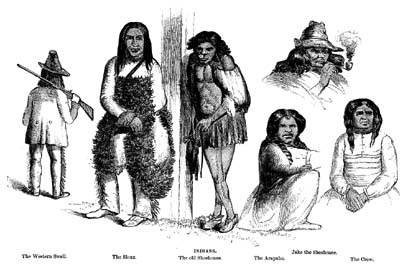
"The qualities of the Sioux, and of the Prairie tribes generally, are little prized by those who have seen much of them. They ignore the very existence of gratitude; the benefits of years can not win their affections.After boarding and lodging with a White for any length of time, they will steal his clothes; and, after receiving any number of gifts, they will haggle for the value of the merest trifle. They are inveterate thieves and beggars; the Western settlers often pretend not to understand their tongue for fear of exposing themselves to perpetual pilfering and persecution; and even the squaws, who live with the pale faces, annoy their husbands by daily applications for beads and other coveted objects; they are cruel to one another as children."
"Impulsive as the African, his mind is blown about by storms of unaccountable contradictions. Many a White has suddenly seen the scalping-knife restored to its sheath instead of being buried in his flesh, while others have been as unexpectedly assaulted and slain by those from whom they expected kindness and hospitality."
"Of their bravery Indian fighters do not speak highly: they are notoriously deficient in the civilized quality called moral courage, and, though a brave will fight single-handed stoutly enough they rarely stand up long in action.They are great at surprises, ambuscades, and night attacks: as with the Arabs and Africans, their favorite hour for onslaught is that before dawn, when the enemy is most easily terrified -- they know that there is nothing whichtries man's nerve so much as an unexpected night attack -- and when the cattle can be driven off to advantage."
Richard Burton, The City of the Saints, NY: Harper & Bros., 1862.
+++++++++++++++++++++++++++++++++++++
"He is ignoble -- base and treacherous, and hateful in every way. Not even imminent death can startle him into a spasm of virtue. The ruling trait of all savages is a greedy and consuming selfishness, and in our Noble Red Man it is found in its amplest development. His heart is a cesspool of falsehood, of treachery, and of low and devilish instincts. With him, gratitude is an unknown emotion; and when one does him a kindness, it is safest to keep the face toward him, lest the reward be an arrow in the back. To accept of a favor from him is to assume a debt which you can never repay to his satisfaction, though you bankrupt yourself trying. To give him a dinner when he is starving, is to precipitate the whole hungry tribe upon your hospitality, for he will go straight and fetch them, men, women, children, and dogs, and these they will huddle patiently around your door, or flatten their noses against your window, day after day, gazing beseechingly upon every mouthful you take, and unconsciously swallowing when you swallow! The scum of the earth!"
"All history and honest observation will show that the Red Man is a skulking coward and a windy braggart, who strikes without warning -- usually from an ambush or under cover of night, and nearly always bringing a force of about five or six to one against his enemy; kills helpless women and little children, and massacres the men in their beds; and then brags about it as long as he lives, and his son and his grandson and great-grandson after him glorify it among the 'heroic deeds of their ancestors.'"
Mark Twain, "The Noble Red Man", The Galaxy, Sept. 1870.
++++++++++++++++++++++++++++++++
Looks like two very different Whites -- Burton and Clemens -- had an amazingly close correspondence of opinion about the nature of "Indians". This info is denied to the young of today. The Burton book is practically unheard of, and is usually spoken of only in the context of Mormonism; the Twain essay is omitted from most (all?) anthologies.
JR